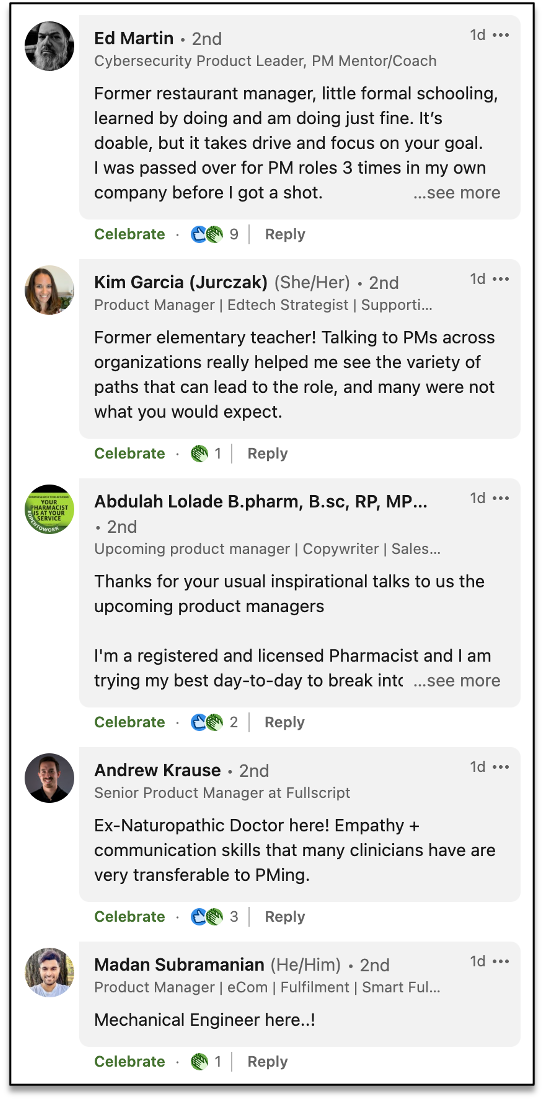
PTPA #002: The Trap of 'Product Manager Certifications'
Aug 27, 2022Read time: 5 minutes
Here's what I think: "Product Manager Certifications" are not the best option for 99% of people trying to become a Product Manager.
One of the key mistakes I see aspiring Product Managers do is thinking that certifications are the easiest way to get the job.
The idea that you will somehow get a job that is in high demand after a 10-hour PowerPoint presentation and a class project is wishful thinking.
Companies take advantage of the growing interest in Product Management to sell you courses that cost up to $5,000 with the promise that you will land a job.
All that time and money spent seems worth it because you were 'taught' by a Product leader from a popular company (who probably just read from some slides they didn't even prepare) and you passed an 'exam' (if any) to be Certified.
Seems worth it until what usually happens next:
- Resume hasn't changed except for 4 new words: "Certified in Product Management".
- Applying to endless Product Manager jobs continues.
- No visible changes to your journey except for having $5,000 less.
Instead, here are alternative paths that I believe in:
Connect with experienced Product Managers
Regardless of how you are planning to approach your journey into Product Management, you need to connect with Product Managers.
To get referrals? No
Your goal is to learn about their role, their company, and what it actually means to be a Product Manager there.
4 easy steps to Network with Product Managers that will yield better results than cold messaging strangers:
- Look at Posts from content creators in the Product Community like Andrew Bowker, Shyvee Shi, and myself.
- Leave a comment in the post. Make it insightful and share what you learned or your personal opinion. Your goal is to invite others to a dialogue.
- Comment on other people's comments. Leave meaningful responses that spark a conversation, and ask questions that you can't google. Make it a conversation.
- Once you receive a response, move the conversations to DMs and schedule a coffee chat.
These are comments on a recent post I made about Product Management backgrounds. If you asked these Product Managers about their experience, you could already start building your network!

Here's the link to the post if you want to go and begin a conversation with them.
Start working on your own side projects
Most aspiring PMs that apply to Product Management jobs don't have the right experience. They are in the same pool as experienced Product Managers competing for the same job.
Side projects are a good way to build skills and help as you tell your story.
But what makes up a good side project?
Anyone can take an existing product, for example, Spotify, and create a presentation to show 'how to improve it'. This is not a side project, but it's good practice for you to develop a Product mindset.
A Product Manager side project can be done at school, at work, or on your day-to-day.
Side projects follow 3 simple rules:
- Document everything you do.
- Build in Public and show your progress to your classmates, or co-workers, or post online - depending on your situation.
- Build a network that sees your work.
Regardless of where you plan to create your project, they all have the same 8 steps in common:
- Pain Points: Find a problem to solve.
- Gather Data: Talk to users. Run interviews and surveys.
- Create Prototypes: Share them with potential users and gather feedback. Improve it.
- Define your Strategy: How is your solution going to solve the problem better than other alternatives?
- Set a roadmap for MVP: What features will your MVP include?
- Work cross-functionally: Find others to help you develop the solution. Using code to solve the problem is ideal, but not mandatory.
- Create a Go-To-Market plan: Let your users know about the upcoming release. Build an email database and/or social media following.
- Launch! and don't stop innovating: Your product is not done when you release it. Your MVP will be used to gather feedback, iterate, and continue developing.
Sounds like a lot more to do than a certification, doesn't it?
Building side projects give you skills and a taste of what Product Managers do in our day-to-day.
In your school, you'll use this project in your stories to show initiative and skills.
In your work, you'll use this project to transfer internally into Product or gain the skills to add them to your resume.
In your day-to-day, if you did this right, you can make it a business.
Entrepreneurship is a good path into Product Management.
Transfer internally into Product Management
Internal transfers are done by gaining trust from a product team and showing that you can do the work.
Be ready to put on a few extra hours at work.
Finding a team that is "close" to you is key. While you may have interest in other products in your company, we are optimizing for the easiest path.
Network with the Product Managers in that team to build a relationship. Just be... human... this is not about a transaction to get a job. Be interested in learning about them as individuals, not just as a potential team to join.
This can take time, be patient.
Once you learn about the team and what they do, think about how you can add value to the team.
- Can you help them do a competitive analysis?
- Can you dig up customer data in your role?
- Can you help them review documents?
- Can you help them with designs?
Ask if you can join one of their internal team calls and offer to take notes. Offer your help to review documents, or help with presentations.
Start small and little by little do more and more for the team.
In time you'll either do Product Manager tasks that you can add to your resume (e.g., helping with user stories, and strategy documents), or prove that you can add value and become a Product Manager in their team.
What if there are no Product teams near you?
You can plan to first move into a role closer to a product team (in your company or a new one), and then plan to transfer into Product Management.
Product Management Certifications are like a cherry on a cake
To bake a Cake, first, you need to gather the ingredients:
- Understand your skills
- Identify skills that you are missing
- Work on elements that showcase your skills (Resume & LinkedIn)
Then, you have to bake the cake:
- Build your own side projects
- Network with other Product Managers
- Improve your storytelling to show all the work you've done
By the time you bake the cake, the cherries (certifications) are merely decoration.
Without the cake, all you have to show is a cherry you paid for.
See you next week!
Whenever you're ready, there are 3 ways I can help you:
- Crush your Product Manager interviews and get an offer here. (350+ students!)
- Schedule a 1:1 session with me for Mock Interviews and Career Guidance here.
- Promote your brand/business to 67K+ LinkedIn followers and 6K+ Newsletter subscribers by sponsoring content.
Helping Everyone To Land Their Next Product Manager Job
Join 8,000+ current and aspiring Product Managers in my Newsletter. Every email gives you a quick and actionable tip on landing your next Product Manager offer.
I hate SPAM. I will never sell your information, for any reason.

